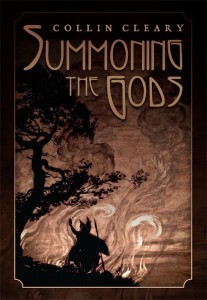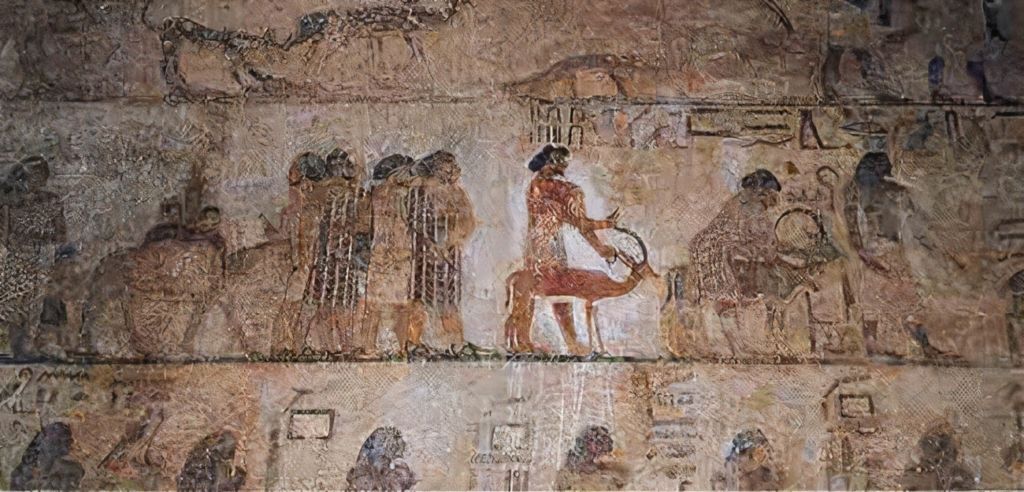A Bit of the Good Book — From an Ethnonationalist Perspective
Morris van de Camp2,681 words
I’ve recently taken interest in the Bible — probably too much interest. I suppose I’m now “clinging” to the Good Book along with my .410 squirrel gun. I’ve even listened to Alexander Scourby’s excellent readings of the King James Bible while driving, and watched numerous TV/Internet documentaries on the historical and archeological aspects of the Biblical stories. So after being reminded of classic euphemisms like the “Biblical know” and to “cover his feet,” I decided to write some commentary on the Old Testament from an American ethnonationalist perspective.
Why should one seriously study what could be a bunch of fables cooked up by schemers in Egypt and the Levant? I understand that many of the people reading this are proud of their heritage, and that heritage’s ancient myths involve Thor, Odin, and Freya, but I’ve come to believe that the Bible is more important for a number of reasons.
First, for better or worse, the Bible is as much a part of our heritage as Thor and Odin. Many Americans trace their ancestry back to the Mayflower, and those first colonists read the Bible a great deal, as did the Puritans, Quakers, and other Anglo-European groups that settled in places outside of Cape Cod.
Second, not everything in the Bible is a fable. You can go to the Near East and find archeological evidence that corroborates, or at least doesn’t disprove, what is claimed in the Bible.
Finally, these stories all originate in an extremely competitive environment that is at the intersection of three major cultural branches of the White Race: the European Greeks/Hittites, the Egyptians, and the Canaanites.
In other words, the examples provided by the Bible’s characters show how to survive in tough times and places, and it teaches one how to avoid making big mistakes. Bible stories have also stood the test of time. The Norse Myth of Baldur being slain by a lance Loki fashioned from mistletoe is entertaining, but not entirely applicable to most day-to-day moral dilemmas. I’ll add that the commandment, “Be fruitful, and multiply” in Genesis 1:28 and 9:7 is a direct and poetic expression of the Darwinian imperative.
This article isn’t an attempt to give an overarching interpretation of the whole of the Bible. Instead it is focused on parts of the Old Testament and some concepts I have thought about and felt worth sharing. I’m not attempting to proselytize or overturn and/or attack the beliefs of anyone reader this; I’m only asking that you hear me out in my interpretation of key Old Testament characters from the perspective of the Right.
The Flaming Sword (of Technology) Keeps Man from Returning to the Garden
The Bible begins with the story of Creation: Adam and Eve in the Garden of Eden. I believe that the story is true, at least in a general mythological sense. What I mean is that the Garden of Eden story can be interpreted as representing hunter-gatherer culture. In Eden there is no clothing, no shame, and no social classes. There are also no money problems or crop failures. It’s the (seemingly) idyllic world of the South Pacific Islanders that the Americans witnessed during the Second World War. When the reader is introduced to Adam and Eve, they aren’t cultivating anything or working particularly hard. Instead, “out of the ground the Lord God made every tree grow that is pleasant to the sight and good for food” (Genesis 2:9 KJV).

You can buy Collin Cleary’s Summoning the Gods here.
The account also clearly puts the Garden of Eden in Mesopotamia, since it names the Tigris and Euphrates Rivers as two of the four rivers present in the Garden. We know from archeology that around 10,000 years ago the hunter-gatherers in Mesopotamia started to transition into settled agriculture. They found the wild precursors to wheat and barley, as well as sheep, cows, and donkeys, and domesticated them.
Once the first field was planted, there was more food — but there were also more people, since women in settled areas could have and care for more children. Along with that came all the problems of modernity. Thus, Adam and Eve are noble savages, but once they (or who they represented in a mythological sense) crossed over to become agriculturalists, they became modern. One could call this transition Original Sin. The culture — white Mediterranean culture — began to change rapidly. A stick became a hoe, which in turn became a plow. Soon after there were swords and spears, priests and gods, cities and temples.
But all of those accomplishments require work. God’s curse on Adam refers to work a great deal:
. . . cursed is the ground for thy sake; in sorrow shalt thou eat of it all the days of thy life;
Thorns also and thistles shall it bring forth to thee; and thou shalt eat the herb of the field; In the sweat of thy face shalt thou eat bread, till thou return unto the ground; for out of it wast thou taken: for dust thou art, and unto dust shalt thou return. (Genesis 3:17-19 KJV)
In other words, once you and the missus are producing children, you need to feed them. You might also need to feed your nephews and nieces if there a disaster befalls some part of your family. Once the agriculturalists have set up their farmsteads, they can’t go back to an idyllic hunter-gatherer culture. Too much has changed. That is the Cherubim with a flaming sword described in Genesis 3:23-24 KJV.
Probably the most celebrated individual to attempt to get back to the Garden of Eden is the Unabomber, Ted Kaczynski. He retreated to the mountains of Montana and waged a mail-bombing campaign against various figures in the technological field.

The nuclear disarmament movement is an attempt to go back to an earlier state following a technological advance. But you can’t ignore advancing technology in a competitive world. Fall behind and one gets beaten. Regardless, the “Peace Sign” is an outstanding example of imagery and graphical design. It combines the “N” and “D” in semaphore.
A far more popular and seemingly respectable attempt to sneak past the Cherubim with a flaming sword is the nuclear disarmament movement that became extremely fashionable in England and elsewhere during the late 1950s and 1960s, and has persisted to a lesser degree since the end of the Cold War.
The thrust of the movement is to get rid of all nuclear weapons. On the surface that seems like a noble goal, but once any nation has The Bomb, it can dominate any nation without it. If a nation gets rid of The Bomb, then they become prey for other nations. Gaddafi’s government in Libya voluntary gave up The Bomb, which they were in the process of developing, in the 2000s and they were soon destroyed by the French, British, and Americans for no clear reason in 2011. The Ukrainians agreed to surrender their nuclear weapons, which they had inherited from the Soviet Union, in 1994 in return for promises from Russia to respect their territorial integrity, but have nevertheless been invaded twice since then, in 2014 and 2022. Nations that could build their own bomb but do not, such as Germany, Japan, and Canada, live under the protection of the American nuclear arsenal.
Ethnic and Identity Conflict
Part I: Pharaoh against Moses
Egyptologists have carefully reconstructed the history of Egypt by translating the hieroglyphics on tombs, as well as correspondence in cuneiform found on clay tablets. What they reveal is a society not unlike that of America’s: There are labor disputes, political problems, civil wars, and ethnic displacement alongside a quest to build great things that last.
One account of a ferocious ethnonationalist conflict in Egypt is found in the Bible. Abraham, a non-Egyptian Hebrew/Hyksos, first goes to Egypt in Genesis, Chapter 12. There he becomes wealthy. Eventually, he returns to Canaan. Then, in Genesis, Chapter 37, Joseph, Abraham’s great-grandson, is sold to Egypt as a slave by his brothers. Eventually, Joseph ends up in prison where he interprets dreams. Then, in Genesis, Chapter 41, the Pharaoh has a dream that describes the business cycle.

Hyksos: This Egyptian painting shows Canaanites traveling to Egypt to trade. Joseph was part of an existing trade route between Canaan and Egypt. There were no political problems with this interaction until the Hyksos/Hebrews got into positions of power and displaced the Egyptians.
Joseph convinces the Pharaoh that he should be allowed to control the collection and storage of Egyptian grain. Eventually, bad years follow the good, and due to Joseph’s control of the grain, the Pharaoh becomes extremely rich, Joseph becomes his powerful assistant, and the Egyptians themselves are dispossessed. After Joseph reconciles with his brothers, they too settle in Egypt.
Egyptian hieroglyphics confirm that there was a displacement of the ruling class by foreigners from the Levant. A group called the “Hyksos” came from Canaan and ended up ruling Egypt from 1630 until 1523 BC. In 1650 BC, we know that Ahmose I attacked and defeated the Hyksos. There is archeological evidence showing there were battles between an Egyptian ethnonationalist army and their Semitic rulers, so it could very well be that Ahmose I was the “new king over Egypt, which knew not Joseph” (Exodus 1:8 KJV).
Admittedly, there are other Pharaohs who might have filled this role, but it is certain that the Hyksos’ elites were defeated and their non-elite members were moved to a lower rung on the socioeconomic ladder. Then, a “Hyksos” named Moses rose to elite status in Egypt and was then exiled into the wilderness after murdering an Egyptian. There, Moses had a vision and returned as a grey-bearded man with much life experience to lead the Hebrews/Hyksos out of Egypt.

Moses didn’t become a successful ethnonationalist leader until he was much older. There is no experience quite like lived experience to guide a leader carrying out a tough mission.
The Exodus story viewed from the perspective of the Egyptians is one of taking their country back, but in doing so, the Egyptians colluded in the Hebrews’ conquest of Canaan. Archeologists have discovered diplomatic correspondence between Canaan and Egypt that date to 1360-1332 BC discussing attacks upon them by “Habiru.” The Egyptians didn’t send aid to the Canaanites, possibly because they sympathized with the Habiru, but they were prepared to pay any price to keep them out of Egypt itself. It is therefore critical that a people continue to control their financial system. To allow others to manipulate it will bring about displacement and social problems.
Part II: Ahab and Elijah
A sympatric fictional account of the life of King Ahab along the lines of I, Claudius by Robert Graves has yet to be written, but should. King Ahab gets a pretty bad rap in the Bible, and that reputation might not be entirely deserved. He did collude with foreign powers, however, and also failed to deter military rivals, oppressed ethnonationalists who should have been his supporters, and otherwise undermined his kingdom’s identity.
Ahab was the King of the Kingdom of Israel after it broke away from Judea following King Solomon’s death. The cause of the split was probably differences over economic policy, but this remains uncertain. Whatever was the case, the northern tribes of Israel were certainly unhappy about being united with the Judeans. The capital of the Kingdom of Israel was Samaria.
King Ahab’s administration started to go downhill when he married Jezebel, a Phoenician woman from Sidon. His marriage was effectively interracial and not unlike that of those liberal whites who adopt a sub-Saharan or Oriental and then parade them around in a fit of empty virtue-signaling. A king can marry whomever he wants, so an unwise marriage indicates poor judgement. It is better for a prince to marry a common girl of his own kind from the shires — like Prince William and Kate Middleton — rather than a foreign troublemaker like Meghan Markle or Wallace Simpson.
The issues come down to symbolism. In the same way that liberal whites pull down statues of Confederates and replace them with minor figures of the “civil rights” social disruption, King Ahab built a “grove,” most likely an Asherah pole in Samaria. All of this caused a negative reaction.
In 1 Kings, Chapter 20, King Ahab has clearly failed to deter King Ben-Hadad of Aram. Ben-Hadad issues a humiliating ultimatum to King Ahab. Initially Ahab decides to accept it, but changes his mind and then wins a narrow victory.
This victory could have turned things around, but King Ahab, more sympathetic to foreign interests than his own people’s, is waging a cultural war against ethnonationalists like the Prophet Elijah who didn’t like things such as the Asherah pole in Samaria. In other words, Ahab’s “wokeness” was a national security threat.
The foreign worshipers of Baal are also not very wise, so King Ahab makes a mistake in supporting them. The priests of Baal allow themselves to enter into a contest with Elijah on Mount Carmel to see whose god is more powerful. The two factions build an altar. The priests of Baal are unable to persuade their gods to set fire to the altar. The Bible says,
And [the priests of Baal] took the bullock which was given them, and they dressed it, and called on the name of Baal from morning even until noon, saying, O Baal, hear us. But there was no voice, nor any that answered. And they leaped upon the altar which was made. And it came to pass at noon, that Elijah mocked them, and said, Cry aloud: for he is a god; either he is talking, or he is pursuing, or he is in a journey, or peradventure he sleepeth, and must be awaked. (1 Kings 18:26-27 KJV)
Elijah’s altar catches fire and burns, including the stones it is made of.
It could be that this was a supernatural event, but it also could have been a setup. There are several types of stone that burn, including coal and shale oil, and there are ways to set a fire unseen. After his altar burns, Elijah’s supporters murder the priests of Baal. They were likely already carrying swords, knives, and spears to do this and had planned the attack from the very beginning.

The priests of Baal unwisely entered into a contest that the Prophet Elijah created on his own terms.
The Bible recounts that Elijah was fed by ravens, and later that he supported a widow and raised her son from the dead. It could be that all of this was caused by supernatural intervention, but another interpretation is that a vast, self-sustaining social network of ethnonationalists helped each other out when things went bad for an individual ethnonationalist. Elijah was followed by his disciple Elisha.
King Ahab also gained a great deal of domestic enmity when he conspired with his wife to dispossess Naboth of his vineyard. Naboth was executed based on false charges. This unjust action of dispossessing a subject damaged property rights and further undermined Ahab’s domestic support. If one supports foreign interests first, dispossessing one’s own kind becomes much easier to do.
Ahab died in battle, killed by a stray arrow after an ill-advised attempt to capture Ramoth-Gilead. Then Elisha, Elijah’s ethnonationalist disciple, gives his support to Jehu, who is very possibly a cousin to Ahab. With the ethnonationalists’ support, Jehu kills Ahab’s son and grandson and takes over the Kingdom. Jezebel dies after being thrown from a window.
Conclusion
There is yet more in the Good Book that applies to our situation, but for now I’ll leave you with the observation that the key part of survival in a tough environment is the women. The women of the Old Testament work very hard to be mothers. Those that have a hard time conceiving pray and seek aid to receive a child. They make a point of bringing as many children into the world as they can. Their actions mean that the Great Replacement is not an option for them; indeed, it is unthinkable. If there is an overarching lesson here, it is to marry a woman of your own kind and raise the next generation.
* * *
Counter-Currents has extended special privileges to those who donate $120 or more per year.
- First, donor comments will appear immediately instead of waiting in a moderation queue. (People who abuse this privilege will lose it.)
- Second, donors will have immediate access to all Counter-Currents posts. Non-donors will find that one post a day, five posts a week will be behind a “paywall” and will be available to the general public after 30 days.
To get full access to all content behind the paywall, sign up here:
Paywall Gift Subscriptions
 If you are already behind the paywall and want to share the benefits, Counter-Currents also offers paywall gift subscriptions. We need just five things from you:
If you are already behind the paywall and want to share the benefits, Counter-Currents also offers paywall gift subscriptions. We need just five things from you:
- your payment
- the recipient’s name
- the recipient’s email address
- your name
- your email address
To register, just fill out this form and we will walk you through the payment and registration process. There are a number of different payment options.
A%20Bit%20of%20the%20Good%20Book%20and%238212%3B%20From%20an%20Ethnonationalist%20Perspective
Enjoyed this article?
Be the first to leave a tip in the jar!
Related
-
Looking for Anne and Finding Meyer, a Follow-Up
-
Bottled Up
-
Pro-Natalist Policies
-
Elizabeth Dilling on the Evil of the Talmud
-
What You Need to Know about the German New Right: An Interview with Martin Lichtmesz
-
America First Legal — or Is It Israel First?
-
The Significant and Decisive Influence that Leads to Wars
-
Whither Thou Goest, Diaspora?


6 comments
Very enjoyable essay. I’m not required to accept the supernatural beliefs of my ancestors but I do respect that Christianity was the religion of my ancestors. There is usable material in the Bible as you have so admirably shown.
Charming essay, although I’m far more skeptical of the historicity of those Old Testament accounts. The Maccabees (now they were ethnonationalists!) ruled Judea from 167 to 37 BC and are suspected of having embellished and sexed-up the ancient texts to encourage Jewish pride and self-confidence.
On Thor and Odin not being a living part of our heritage. True, and perhaps unfortunate, but we westerners now seek our common cultural signposts in art: novels, poetry and movies. We don’t pretend that an ancient legend is literally true; and our imaginary worlds include monsters, wonders and voyages (all three found in Alien) that rival those found in tales of old.
An interesting interpretation of the Bible for our modern ethnonationalist purposes. However there are two (minor) mistakes:
“…What I mean is that the Garden of Eden story can be interpreted as representing hunter-gatherer culture. In Eden there is no clothing, no shame, and no social classes. There are also no money problems or crop failures. It’s the (seemingly) idyllic world of the South Pacific Islanders that the Americans witnessed during the Second World War…”
The South Pacific Islanders didn’t live as hunter-gatherers, they had developed horticulture already long ago, mainly cultivating yams, and they raised pigs. Besides, they had priests, kings and knew war. Their “idyllic” life is a myth.
“…King Ahab’s administration started to go downhill when he married Jezebel, a Phoenician woman from Sidon. His marriage was effectively interracial and not unlike that of those liberal whites who adopt a sub-Saharan or Oriental and then parade them around in a fit of empty virtue-signaling…”
His marriage was interethnic but not interracial, there were no dramatic racial differences between the Israelites and the Phoenicians. All conflicts between the Israelites and the surrounding peoples were ethno-religious but never racial, because there were no racial differences.
three major cultural branches of the White Race: the European Greeks/Hittites, the Egyptians, and the Canaanites.
I know that discussions of racial taxonomy usually lead to as much hair-splitting madness as do discussions of religion, but I offer an alternative:
The Caucasian branch of the Homosapian species includes all the groups you mention, but IRL now, it is only the European subgroup which is White. White = European and only European.
All Whites are Caucasians but not all Caucasians are White.
Plus:
Our Christian ancestors, until the last ten sad minutes, all read the Bible, Old Testament included, as a Christian book and therefore as an anti-Jewish book. It is the only safe way for Whites to read it.
“…All Whites are Caucasians but not all Caucasians are White…”
If non-European Caucasians “don’t look white” it is because they are mixed with other races, such as Neanderthals, Negroids, Australoids or Mongoloids. Unmixed non-European Caucasians do look white, though of a different kind than Europeans, such as for example this Berber woman:
https://qph.fs.quoracdn.net/main-qimg-5c3ffcbb2562bec1ef9b55e04f1b11ea-pjlq
I enjoyed this essay as I do all of this authors. I do want to read the Bible, but there are so many books in my queue, I don’t know if I will ever. Right now I’m substituting Edith Hamilton’s insightful summaries, Spokesmen for God and Witness to the Truth.
I would like to ask, if I may, when the author says “marry a woman of your own kind,” what exactly he means? What sorts of person would fulfill that for a white, mutticized guy like me?
Comments are closed.
If you have Paywall access,
simply login first to see your comment auto-approved.
Note on comments privacy & moderation
Your email is never published nor shared.
Comments are moderated. If you don't see your comment, please be patient. If approved, it will appear here soon. Do not post your comment a second time.
Paywall Access
Lost your password?Edit your comment